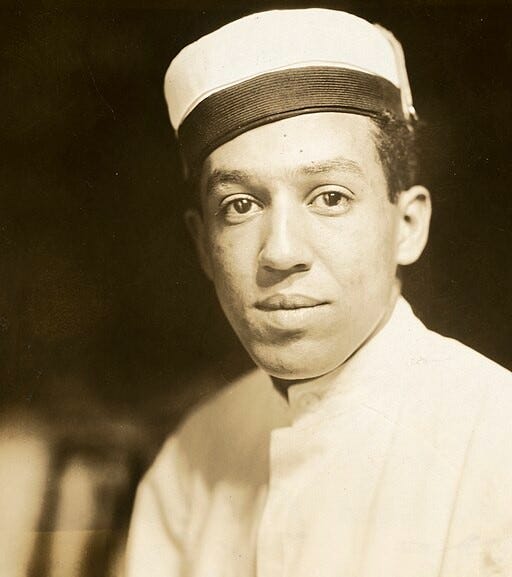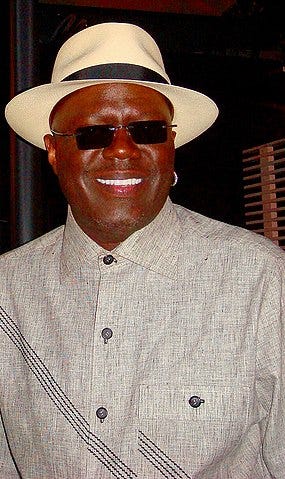Undisputed pride in Blackness
My take on the Harlem Renaissance, Langston Hughes, Bernie Mac and beyond

Writer’s note: This past weekend, my mother came over to my home with a binder full of articles and essays I wrote during my college years. I’m not particularly thrilled to read my old work before I became a professional editor because I always want to rewrite and correct everything. (“Change for a Twenty” is nowhere near as clean as “Round Trip.”) I expected to discard the entire binder. To my delight, I’m finding essays that I don’t remember writing at all, but I agree with every word of them. I know I wrote them, but it’s more than two decades since I’ve seen these posts so they’re “new” again to me.
One entitled “Undisputed Pride” stood out to me, and it was written on April 16, 2002 for an African-American Literature class — two years after the failed English final that almost led to expulsion. I’m repurposing the second essay (graduated Cum Laude) largely as it was written, with minimal editing outside of grammar and punctuation. Keep in mind that Bernie Mac is STILL one of my top-five favorite comedians of all time. I just didn’t agree with him on this particular topic. It’s all love, and he was an amazing talent. May he rest in peace.
On “The Original Kings of Comedy” special, which aired on Comedy Central, comedian Bernie Mac didn’t flinch before saying, “I don’t want to be known as a Black comedian. I just want to be known as a comedian.”
In this same special, comedian Chris Tucker stated on February 11, that he didn’t believe in “Black comedy” or “white comedy.”
“If you’re funny, you’re funny,” was Tucker’s explanation of why there should be no such differentiation.
But another man with just as strong an opinion is a very well-known poet of the Harlem Renaissance named Langston Hughes.
ADVERTISEMENT ~ Amazon
As an Amazon affiliate, I earn a percentage from purchases with my referral links. I know some consumers are choosing to boycott Amazon for its DEI removal. However, after thinking about this thoroughly, I want to continue promoting cool products from small businesses, women-owned businesses and (specifically) Black-owned businesses who still feature their items on Amazon. As of the first date of Black History Month 2025, each new post will ALWAYS include a MINIMUM of one product sold by a Black-owned business. (I have visited the seller’s official site to verify that Amazon Black-owned logo.) I am (slowly) doing this with older, popular posts too. If you still choose to boycott, I 100% respect that decision.
In a short essay entitled “The Negro Artist and the Racial Mountain,” he stated that “this is the mountain standing in the way of any true Negro art in America — this urge within the race toward whiteness, the desire to pour racial individuality into the mold of American standardization, and to be as little Negro and as much American as possible*.”
Recommended Read: “Failed my English final, became a professional writer Blog 3 of 8: School expulsion, failing grade ~ Why I chose the Harlem Renaissance for my Toastmasters speech”
Hughes is completely against Blacks not claiming their identity. He believes that a Black poet who doesn’t want to be known as “Black” would rather be white. I assume that he would look at Bernie Mac not wanting to be known as a “Black comedian” in the same context.

In all fairness, Bernie Mac argues that white comedians aren’t known as “white comedians” so why should Blacks be given this title. Hughes is disturbed with the logic Black people have in taking the title of being labeled “Black” and wonders why Black entertainers don’t want to be known as such. He believes they’re trying to desert their identity.
Recommended Read: “Should companies advertise themselves as black-owned? ~ Why race should not ‘matter’ … and why it does to me anyway”
But Hughes doesn’t half-step over how Blacks sometimes don’t support each other. He says, “that Charles Gilpin acted for years in Negro theatres without any special acclaim from his own, but when Broadway gave him eight curtain calls, Negroes, too, began to beat a tin pan in his honor**.”
This statement may support Bernie Mac’s and Chris Tucker’s opinions. Like another Black comedian said on “Comic View,” “You know you somebody when white people come to see you.”






